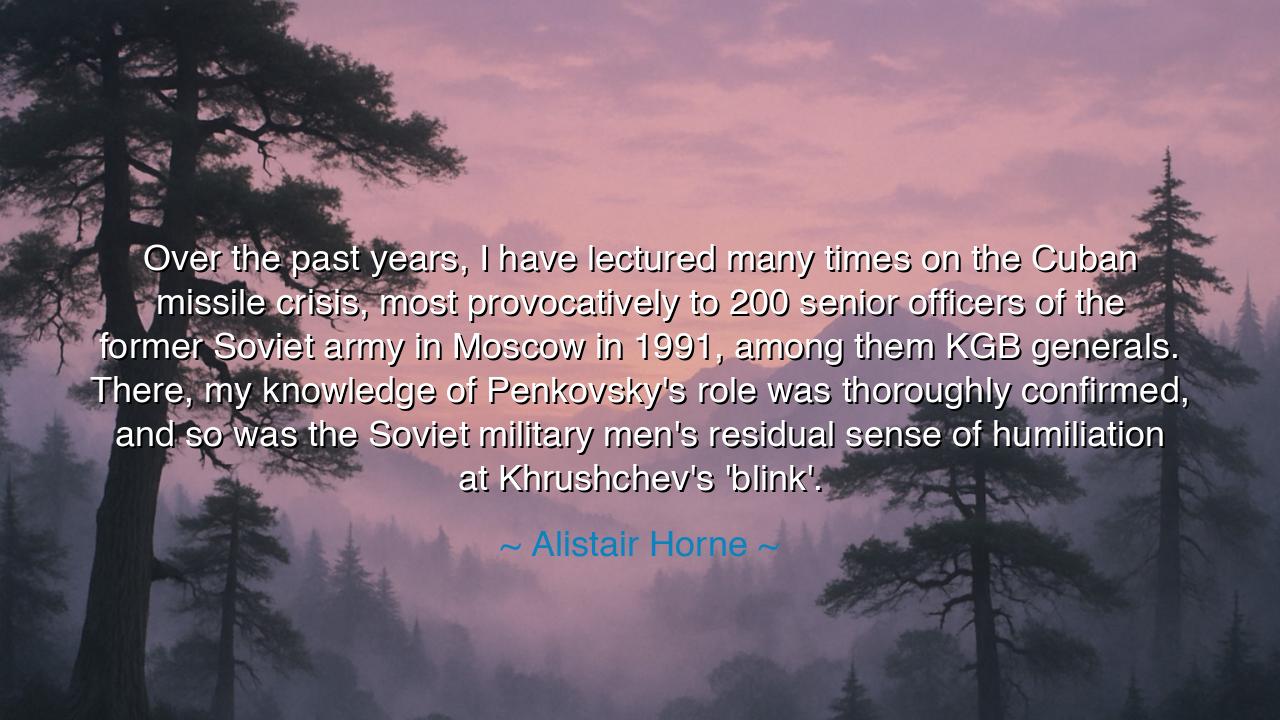
Over the past years, I have lectured many times on the Cuban
Over the past years, I have lectured many times on the Cuban missile crisis, most provocatively to 200 senior officers of the former Soviet army in Moscow in 1991, among them KGB generals. There, my knowledge of Penkovsky's role was thoroughly confirmed, and so was the Soviet military men's residual sense of humiliation at Khrushchev's 'blink'.






Alistair Horne, historian of war and empire, bore witness to one of the most perilous struggles of the modern age when he declared: “Over the past years, I have lectured many times on the Cuban missile crisis, most provocatively to 200 senior officers of the former Soviet army in Moscow in 1991, among them KGB generals. There, my knowledge of Penkovsky's role was thoroughly confirmed, and so was the Soviet military men's residual sense of humiliation at Khrushchev's 'blink'.” In these words lies not only the tale of a lecture, but the living memory of a world once balanced on the edge of destruction. For here we see how the Cuban Missile Crisis, though avoided as apocalypse, left behind scars of humiliation, pride, and secrecy that endured for decades.
The Cuban Missile Crisis of 1962 was a moment when humanity stood upon the brink of annihilation. The Soviet Union had placed nuclear missiles in Cuba, and the United States, under President Kennedy, demanded their removal. For thirteen days, the world held its breath, as two empires faced each other with arsenals capable of extinguishing civilization itself. At last, Khrushchev blinked—he agreed to withdraw the missiles in exchange for American assurances not to invade Cuba and a secret promise to withdraw missiles from Turkey. The world rejoiced at survival, but in the halls of Soviet power, humiliation festered like a hidden wound.
Horne, in Moscow in 1991, spoke not to ordinary men but to the very architects of the Cold War: senior Soviet officers and KGB generals. These men had carried the weight of empire, their pride bound tightly to the image of strength. For them, Khrushchev’s retreat was not wisdom but weakness, a wound to the honor of the Soviet military. That sense of humiliation still burned nearly thirty years later, even as the Soviet Union itself crumbled into dust. Thus, Horne’s words reveal a paradox of history: what the world saw as a victory of peace, others carried as the bitterness of defeat.
Central to his statement is the role of Oleg Penkovsky, the Soviet intelligence officer who secretly provided the West with vital information. It was Penkovsky’s reports that confirmed the extent of Soviet capabilities and intentions, allowing Kennedy’s administration to respond with firmness and precision. For the Soviets, his betrayal was a dagger in the back, and his contribution to Khrushchev’s humiliation made the memory of the crisis even more bitter. To Horne, the Soviet generals confirmed what history already suggested: that Penkovsky’s shadow loomed large in the drama, and his treachery amplified the sting of their leader’s retreat.
From this story, the lesson is clear. Leadership in crisis demands not only strength, but also the humility to know when to step back from the abyss. Khrushchev’s “blink” saved the world from nuclear war, yet it cost him prestige among his own men. Here lies the eternal tragedy of power: to preserve life may be seen as weakness by those who hunger for pride. The wise must learn that true strength is measured not in the applause of generals, but in the survival of the people.
What then must we learn for our own lives? That in moments of conflict—whether between nations, families, or within ourselves—the courage to yield may sometimes be greater than the courage to strike. Pride whispers “never blink,” but wisdom reminds us that peace is often won in restraint. Horne’s tale of Soviet humiliation is a warning: those who measure only in victories and defeats miss the deeper truth—that life itself is the ultimate prize.
Practical actions follow from this. In your dealings, cultivate the discipline of humility. When argument rises, do not think only of winning, but of preserving harmony. When your pride demands dominance, ask instead what the consequences of your choice will be. And when history places you at a crossroads, remember that the legacy of peace is far greater than the fleeting honor of conquest.
Thus, children of the future, remember Horne’s testimony. The Cuban Missile Crisis was not merely a tale of missiles and leaders, but of pride and humility, betrayal and restraint. Khrushchev blinked—and the world lived. Let that truth be your guide: that sometimes, the greatest act of leadership is to endure humiliation in order to spare humanity. For in such sacrifice lies the deepest wisdom, and in such wisdom lies the hope of peace.






AAdministratorAdministrator
Welcome, honored guests. Please leave a comment, we will respond soon